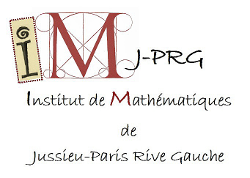http://gtm.imj-prg.fr/
Pour recevoir le programme par e-mail, écrivez à : antoine.ducros@imj-prg.fr
Pour les personnes ne connaissant pas du tout de théorie des modèles, des notes introduisant les notions de base (formules, ensembles définissables, théorème de compacité, etc.) sont disponibles ici : https://webusers.imj-prg.fr/~zoe.chatzidakis/papiers/MTluminy.dvi/MTluminy.dvi. Ces personnes peuvent aussi consulter les premiers chapitres du livre Model Theory and Algebraic Geometry, E. Bouscaren ed., Springer Verlag, Lecture Notes in Mathematics 1696, Berlin 1998.
Les notes de quelques-uns des exposés sont disponibles.

